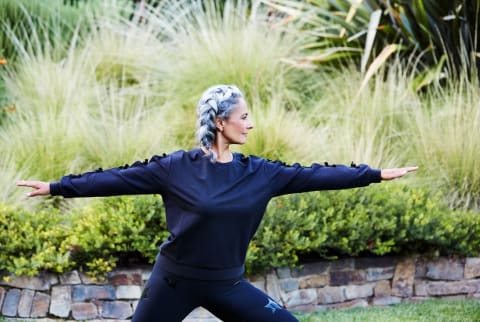Advertisement
5 Ways To Deal With Hot Flashes Naturally


As an (almost) 50-year-old woman who had chemotherapy at a young age, I have experienced many hot flashes in my lifetime. When I was younger, perimenopausal women would just look at me and say, "You just wait," not realizing that I knew exactly what they were talking about. The uncomfortable feeling when you are talking to someone and know they are wondering why you all of a sudden became pink or even red-faced with glistening skin. The discomfort of getting hot and then cold throughout the night, kicking off the covers only needing to put them all back on in a minute when you start shivering. The worry about what else would change in my body as my hormones shifted. I admit, it was a difficult time. As a breast cancer survivor, hormonal therapy was something that every doctor, myself included, wanted to avoid. The good news is that there are many other natural therapies that can help give you relief from hot flashes.
Even though there has been extensive research about hot flashes, there are many aspects of hot flashes that we do not understand. It is hypothesized that hot flashes occur because of a shift in the body’s thermoregulatory systems1. Shifts in estrogen can be the cause of these deregulations, but low levels of estrogen aren't the only problem, as a shift in estrogen can cause symptoms as well. This is why the sudden shift in estrogen that occurs after a total hysterectomy or chemotherapy, for example, can result in more extreme hot flashes.
In menopause, hot flashes typically become less of a problem. After your estrogen evens out, despite its lower level, hot flashes usually decrease in intensity or stop completely. This means that the most challenging time for hot flashes is during the transition from higher levels of estrogen in your body to lower levels of estrogen that occur when we are postmenopausal. So what can you do to help aid this time of transition?
1. Avoid caffeine.
Anything that stimulates your sympathetic nervous system (the fight-or-flight aspect of your nervous system) can stimulate a hot flash when your hormones are in transition. Studies2 show that as caffeine intake increases, so do hot flashes. Wean down your coffee or caffeinated tea and substitute with herbal teas. Brew yourself some herbal tea and make it iced for an even more cooling effect. You might even find that you have MORE energy once you cut down on caffeine.
2. Balance blood sugar.
Balance is important to all aspects of life and our health. When your hormones are transitioning, you often feel a huge sense of imbalance, which is why it's even more important to embrace behaviors that help create balance in the body during this time. This includes balancing your blood sugar. To do this, focus on getting a good source of protein (fish, chicken, beef, egg, nuts, beans, and legumes), healthy forms of fat (avocado, nuts and nut butters, olive oil, and animal protein with natural fats in them), and fiber at each meal. Have fat, fiber, and protein at every meal, and avoid simple refined carbohydrates and added sugar, and your blood sugar will stay more even throughout the day.
3. Do breathwork.
Paced, deep breathing activates your diaphragm and relaxation response and reduces the sympathetic nervous system activity in your body. Fifteen minutes of breathwork3 twice daily has been shown to cut the amount and intensity of hot flashes significantly. There are many great breathing and meditation apps out there to use, but a simple breathing exercise you can do on your own is to breathe in for a count of five, allowing your belly to soften and expand out, and then breathe out for a count of five. Do this for 15 minutes in the morning and evening, and watch your hot flashes diminish. Remember to call upon breathwork when a hot flash comes on. This will remind you to calm your sympathetic nervous system during the day.
4. Practice yoga and exercise.
Exercise like yoga releases stress, boosts endorphin levels, and helps the body release adrenaline. Because of this, exercise can greatly assist a woman's transition into menopause. Aim for 40 minutes of exercise every day. Getting outside in the morning can also help you sleep better at night. And of course, exercise is great for your overall health as well.
5. Try herbs.
Black cohosh and rhubarb extract are some of my favorite herbs for helping decrease hot flashes. I also found acupuncture to be very helpful in decreasing my own hot flashes (and many of my patients report the same benefit). My acupuncturist explained that she was working on strengthening my yin and calming my yang; this helps cool your body and can help tremendously with all of the symptoms of perimenopause. I recommend acupuncture for many of my patients.
6. Keep it cool.
Keeping your body cool will help decrease the amount and intensity of your hot flashes. You can keep your core body temperature cool by dressing in layers, keeping the room cool, avoiding heavy blankets at night, consuming cool drinks, and using a fan. These practical tips are helpful to many!
And finally, your perception of hot flashes matters! Adjusting my attitude about my hot flashes helped me the most. I changed my self-talk and said to myself that this heat was helping my body detoxify and reminded myself that these hot flashes would get better soon. I also worked on my gratitude, realizing that hot flashes were better than the alternative of not surviving my cancer treatment. I took a deep breath every time they came on, reminding me to work to calm my sympathetic nervous system, which helped me with much more than just calming down my hot flashes. They do subside eventually!
Want to know more about menopause? Here are 8 myths about this big life transformation we can stop believing right now.